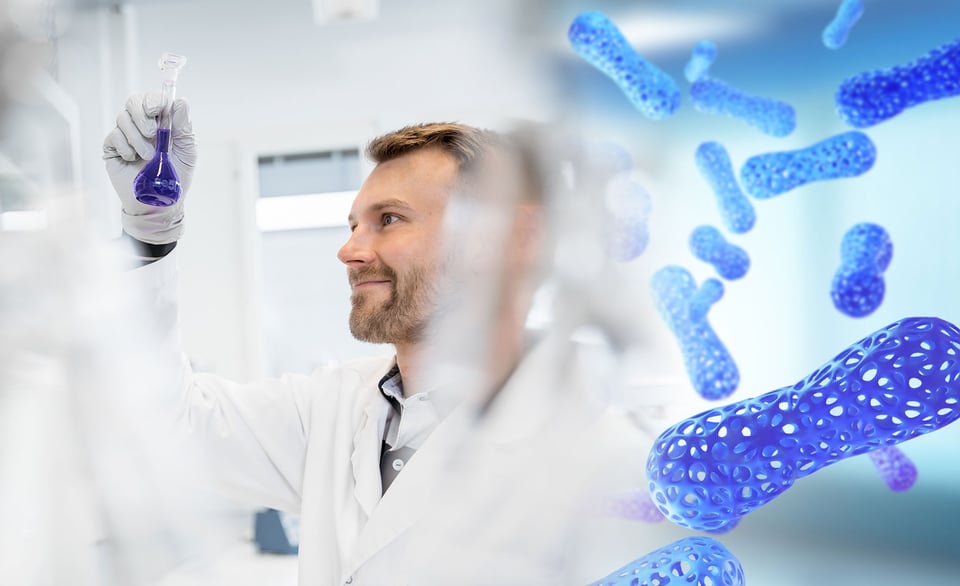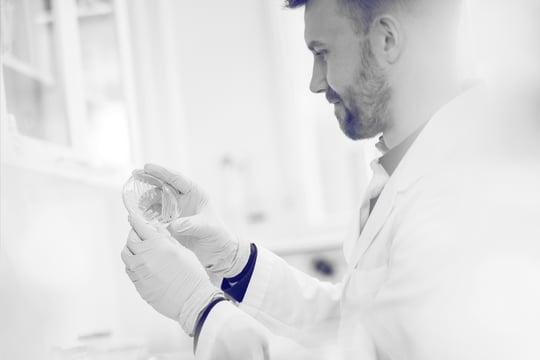
Biosafe’s Jouni Heikkinen and Janne Ylärinne attended the Probiota 2025 conference in Copenhagen, where leading experts converged to discuss the latest advancements in microbiome science and probiotic innovation. Here, we share key insights and emerging concepts shaping the future of gut health.

Biosafe's Janne Ylärinne and Jouni Heikkinen at Probiota 2025 in Copenhagen,
exploring next-gen Probiotics & Postbiotics.
Prebiotics – Fueling gut health
Prebiotics are non-digestible ingredients that stimulate the growth of beneficial microorganisms in the intestines. They serve as nourishment for probiotics, enhancing gut microbiota balance and overall digestive health. Common sources of prebiotics include dietary fibers like inulin, fructooligosaccharides (FOS), and galactooligosaccharides (GOS). These compounds are found in foods such as garlic, onions, bananas, and whole grains. By nourishing beneficial bacteria, prebiotics can enhance gut health, improve digestion, and boost the immune system.
Postbiotics – Beyond living microbes
Postbiotics are defined by the International Scientific association of Probiotics and Prebotics (ISAPP) as “a preparation of inanimate microorganisms and/or their components that confers a health benefit on the host”. Thus, postbiotics can contain inanimate cells and/or their components, and metabolites. The metabolites include, for example, vitamins B and K, short-chain fatty acids (SCFAs), enzymes, peptides, and other metabolites that can have various health benefits. Postbiotics are known to enhance the immune system, reduce inflammation, and improve gut barrier function. Unlike probiotics, which are live microorganisms, postbiotics are non-living and can be more stable and easier to incorporate into food products and supplements.
Next-gen probiotics – New frontiers
Beyond traditional probiotic strains like the ones in the Lactobacilliceaea family and genera Bifidobacterium, next-generation probiotics feature novel microbial species with targeted health benefits. Akkermansia muciniphila, for example, has been linked to improved metabolic health and reduced inflammation. Other examples include Faecalibacterium prausnitzii, known for its anti-inflammatory properties, and Bacteroides uniformis, which may help with weight management. These next-generation probiotics are being researched for their potential to address a wide range of health issues, from metabolic disorders to mental health conditions. Novel species, however, require safety assessment and pre-market authorisation before they can be marketed.
Synbiotics – Enhanced gut support
Synbiotics are a combination of probiotics and prebiotics designed to synergistically improve gut health. The prebiotics in synbiotics serve as a food source for the probiotics, enhancing their survival and activity in the gut. This combination can provide a more comprehensive approach to supporting the gut microbiome. For example, a synbiotic product might combine a specific strain of Lactobacillus with inulin to promote the growth and activity of the probiotic, leading to improved digestive health and immune function.
Introducing the Pantryome
Dr. Jeremy Burton's concept of the "pantryome" describes the microbial ecosystem as a collaborative nutritional network, where metabolites produced by one microorganism can benefit the entire microbial community. There is an interconnected relationship between the microbiome and the human host, where microbial communities share nutritional metabolites, enabling bacteria to exchange resources. This concept suggests that health and disease should be understood through the lens of this shared ecosystem, rather than individual microbial or host cells. Burton emphasises the importance of viewing the colon and its microbiota as crucial for well-being, not just as a waste stream. Advancing prebiotics and postbiotics delivery to optimise the pantryome ultimately offer new avenues for supporting human health with more targeted and efficient nutritional strategies.
The promising future of (pro)biotics
The field of probiotics is expanding rapidly, unveiling groundbreaking connections such as the microbiota-gut-brain axis. Current research suggests gut microbiota can significantly influence mental health, mood regulation, stress resilience, sleep patterns, and cognitive function. As knowledge grows, the potential to enhance overall healthspan through tailored probiotic interventions becomes increasingly realistic.
As we continue to learn more about the microbiome, we can begin to refine and personalise our approach to gut health. What works for one person may not work for another, highlighting the need for individualised probiotic therapies. The future of probiotics holds great promise for improving human health and well-being. However, safety first, like we here at Biosafe like to say.
Partner with Biosafe to leverage our carefully designed services and elevate the quality and safety of your probiotic and starter culture products. Contact us today to learn more about how we can support your innovation and growth in this dynamic field.





/Lopputuote/microbial-products-biosafe-2-1920x1280.jpg?width=540&name=microbial-products-biosafe-2-1920x1280.jpg)




